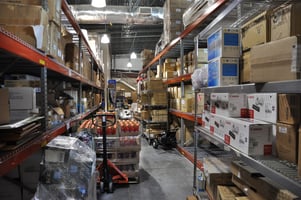Discover how streamlining logistics solutions can help optimize warehouse operations and improve...
Surviving High Diesel Prices: Impact & Solutions
Discover the effects of rising diesel costs and practical strategies to navigate through financial challenges.
Understanding the Impact of High Diesel Prices
Rising diesel prices can have a significant impact on businesses and individuals alike. As diesel is a commonly used fuel for transportation and heavy machinery, an increase in its price can result in higher operating costs for businesses, which can ultimately lead to higher prices for consumers. The impact of high diesel prices can be felt across various sectors, including logistics, agriculture, and construction.
One of the primary effects of high diesel prices is the increase in transportation costs. Businesses that rely on diesel-powered vehicles for the transportation of goods may experience a decrease in profit margins due to the additional expenses incurred. This can be particularly challenging for small businesses that operate on tight budgets.
Moreover, high diesel prices can also contribute to inflationary pressures. When the cost of transporting goods increases, businesses may pass on the additional expenses to consumers by raising the prices of their products or services. This can result in an overall increase in the cost of living for individuals.
In addition to the economic impact, high diesel prices can also have environmental consequences. Diesel fuel is known for its higher carbon emissions compared to other types of fuel. When diesel prices are high, businesses and individuals may be less inclined to invest in fuel-efficient vehicles or alternative fuel options, leading to increased pollution levels and environmental degradation.
Overall, the impact of high diesel prices is multifaceted, affecting businesses, consumers, and the environment. It is crucial for stakeholders to understand these effects in order to develop effective strategies to mitigate the financial challenges posed by rising diesel costs.
Adapting Business Strategies to Offset Diesel Cost Increases
To navigate the financial challenges posed by high diesel prices, businesses can employ various strategies to offset the cost increases. Adapting business strategies can help mitigate the negative impact on profit margins and maintain competitiveness in the market.
One strategy is to optimize route planning and vehicle utilization. By carefully planning delivery routes and maximizing the use of available vehicles, businesses can minimize fuel consumption and reduce overall costs. This can be achieved through the use of advanced logistics software and tracking systems that provide real-time data on vehicle locations and fuel efficiency.
Another approach is to invest in fuel-efficient vehicles and technologies. While the initial investment may be higher, fuel-efficient vehicles can significantly reduce fuel consumption and lower operating costs in the long run. Businesses can also explore hybrid or electric vehicles as alternative options that offer both cost savings and environmental benefits.
Furthermore, implementing driver training programs can contribute to fuel efficiency. By educating drivers on efficient driving techniques, such as reducing idling time and maintaining optimal speeds, businesses can improve fuel economy and reduce fuel expenses.
Additionally, businesses can consider negotiating fuel contracts with suppliers to secure stable prices. Long-term contracts and strategic partnerships can provide businesses with more predictable fuel costs, allowing for better financial planning and budgeting.
Adapting business strategies to offset diesel cost increases requires a proactive approach and a willingness to explore innovative solutions. By implementing these strategies, businesses can mitigate the financial impact of high diesel prices and maintain sustainable operations.
Exploring Alternative Fuel Options for Cost-Efficiency
As the cost of diesel continues to rise, exploring alternative fuel options can offer cost-efficiency and environmental benefits for businesses. By diversifying fuel sources, businesses can reduce their dependence on diesel and potentially lower operating costs.
One alternative fuel option is compressed natural gas (CNG). CNG is a cleaner-burning fuel compared to diesel and can be used in a variety of vehicles, including trucks and buses. Converting vehicles to run on CNG may require initial investment, but the long-term cost savings can be significant.
Another option is biodiesel, which is a renewable fuel made from vegetable oils or animal fats. Biodiesel can be used as a blend with diesel fuel or as a standalone fuel, depending on the vehicle's compatibility. Businesses can explore the availability and feasibility of using biodiesel in their fleet to reduce emissions and potentially lower costs.
Electric vehicles (EVs) are also gaining popularity as an alternative to diesel-powered vehicles. While the infrastructure for EV charging is still developing, businesses can consider incorporating electric vehicles into their fleet for short-distance transportation or urban deliveries. The initial cost of EVs may be higher than diesel vehicles, but the long-term savings on fuel and maintenance costs can outweigh the upfront investment.
When exploring alternative fuel options, businesses should consider factors such as availability, infrastructure, vehicle compatibility, and potential government incentives or subsidies. Conducting thorough research and consulting with experts can help businesses make informed decisions regarding the adoption of alternative fuels.
By embracing alternative fuel options, businesses can not only reduce their fuel expenses but also contribute to a greener and more sustainable future.
Implementing Fuel Efficiency Measures in Daily Operations
Implementing fuel efficiency measures in daily operations can help businesses optimize fuel consumption and reduce costs. By adopting sustainable practices and technologies, businesses can improve their fuel efficiency and minimize the impact of high diesel prices.
One measure is to regularly maintain and tune vehicles for optimal performance. Proper maintenance, such as regular oil changes, tire rotations, and air filter replacements, can improve fuel efficiency and prevent unnecessary fuel consumption. Businesses should also ensure that vehicles are properly calibrated and that any engine issues are promptly addressed.
In addition, businesses can encourage eco-driving practices among their drivers. This includes techniques such as avoiding rapid acceleration and deceleration, maintaining a steady speed, and minimizing idling time. Providing drivers with training and incentives for eco-friendly driving can promote fuel efficiency and reduce fuel expenses.
Furthermore, businesses can invest in technology solutions that monitor and optimize fuel consumption. Telematics systems, for example, provide real-time data on vehicle performance and fuel efficiency, allowing businesses to identify areas for improvement. By analyzing this data, businesses can make informed decisions to optimize fuel consumption and reduce costs.
Lastly, businesses can promote a culture of fuel efficiency and sustainability within their organization. This can be achieved through awareness campaigns, employee training programs, and setting fuel efficiency goals. By involving employees in the effort to reduce fuel consumption, businesses can create a sense of shared responsibility and encourage sustainable practices.
Implementing fuel efficiency measures requires a holistic approach that encompasses maintenance, driver training, technology adoption, and organizational culture. By prioritizing fuel efficiency, businesses can effectively manage the impact of high diesel prices and contribute to a more sustainable future.
Collaborating with Industry Partners for Collective Solutions
In the face of high diesel prices, collaboration among industry partners can lead to collective solutions that benefit all stakeholders. By sharing knowledge, resources, and best practices, businesses can navigate the challenges posed by rising diesel costs more effectively.
One form of collaboration is forming partnerships with suppliers and distributors. By establishing long-term relationships with reliable partners, businesses can negotiate favorable fuel prices and secure stability in their supply chain. This can help businesses mitigate the financial impact of fluctuating diesel prices and maintain consistent operations.
Additionally, industry associations and networks can provide a platform for businesses to exchange ideas and collaborate on fuel efficiency initiatives. These associations often have access to industry experts and resources that can help businesses identify cost-saving opportunities and implement sustainable practices.
Furthermore, collaborating with competitors can lead to innovative solutions and cost-sharing opportunities. By pooling resources and expertise, businesses can explore joint purchasing agreements for fuel or share transportation infrastructure, reducing individual costs and increasing operational efficiency.
Government agencies and organizations focused on sustainability can also play a vital role in facilitating collaboration. By providing funding, incentives, and policy support, these entities can encourage businesses to adopt fuel-efficient practices and invest in alternative fuel technologies.
Collaborating with industry partners requires a mindset of cooperation and a willingness to share knowledge and resources. By working together, businesses can create a stronger, more resilient industry that is better equipped to navigate the challenges of high diesel prices.


